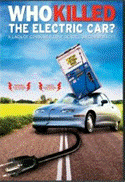| |
2006 November 25
Copyright © Brian Wright
Who Killed the Electric Car (2005)___________9/10
Clue: It wasn't inferior technology
Documentary written and directed by
Chris Paine
Selected Cast
Chelsea Sexton: Herself, a former GM employee currently serving as executive director of Plug-In America. A leading activist for alternative automotive power.
Various activists, industry spokespeople, Hollywood celebrities, and political and environmental personalities.
Who Killed the Electric Car? is a clever, heart-wrenching post-mortem of the GM electric car by first-time director Chris Paine. The film, made for a budget of one million dollars, premiered in January 2006 at the Sundance Film Festival and has been gathering viewer-advocates ever since.
In the 1990s, the California Air Resources Board (CARB) imposed a requirement that auto manufacturers include a small percentage of “zero emission” vehicles to sell cars there.
In response, General Motors built the EV1. The initial release in 1997 had a range of 55-75 miles. The second generation of EV1s released in the 2000 model year were equipped with advanced batteries for a range of 75-150 miles.
The air-conditioned EV1s had equal or better acceleration and cruising speeds than their internal-combustion-engine counterparts. The list of EV1 advanced features reads like a Green auto-enthusiast’s wet dream: including regenerative braking, traction control, and an air drag coefficient of 0.19.
From 1997 to 2001, approximately 800 EV1 vehicles were leased, with the provision that the cars revert to the manufacturer at lease end. Ref. Wikipedia.
The car was affordable by middle-class standards. With mass production rates (and competition), similar commuter-oriented electric vehicles would be available for—my educated engineer’s guess—less than $10,000. More important, car electricity now costs less than a fifth of car gasoline for the same miles.
There was a enthusiastic market for the EV1 and the other electric vehicles. On the Letterman Show, Tom Hanks praises his EV1, how wonderful and fast it is. People were literally lining up to purchase EV1s, despite GM’s resistance to selling them.
GM corporate set up detailed highly personal questionnaires, even for celebrity would-be buyers, as one of many hoops customers had to jump thru to qualify for a car.
In 2001, under threat by a lawsuit by the auto companies and the federal government, CARB removed the requirement for electrics. GM stopped making the EV1 and proceeded to withdraw and destroy the cars it had leased. Why?
GM determined with tax policy and the price markups of large vehicles, the car of its future was the Hummer. As for the oil companies, they have obvious short-range incentives to kill electrics as competition… in the dead of night, if they can.
My feeling is the EV1 is like the movie The Producers. They tried to make a flop, but it became a huge hit that embarrassed them. In GM’s case, it tried to recover by returning to its self-destructive, conservative-dinosaur ways.
But this movie conveys a positive, hopeful message that innovative technology will come to the people very soon and massively, whether government-protected corporations stick their heads in the oil or not. |



|




